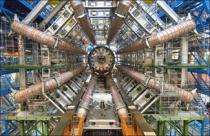Probing Question: Could the Large Hadron Collider swallow the Earth?

Nestled 570 feet beneath the Alps on the Swiss-French border is the world’s largest physics experiment — the Large Hadron Collider (LHC). Constructed for $8.8 billion by the European Organization for Nuclear Research (CERN) in Geneva, Switzerland in collaboration with hundreds of universities and labs worldwide, the LHC was built to test various key predictions of high-energy physics by smashing proton beams together at high speeds.
Critics contend that the awesome power of the LHC — which will accelerate particles at up to 99.99 percent of the speed of light and create temperatures in the trillions of degrees — has the potential to create a black hole that could consume the Earth. These fears have resulted in a lawsuit filed at the European Convention of Human Rights with motions against the 20 countries, including the U.S., which have funded the project.
Should we be worried?
“Absolutely not,” is the verdict from Stéphane Coutu, Penn State professor of physics. “The world is constantly bombarded by energetic cosmic rays from the depths of space, some of them inducing particle collisions thousands of times more powerful than those that will be produced by the LHC,” explained Coutu. “If these collisions could create black holes, it would have happened by now.”
Fears about black holes are exacerbated by media hype about the supercollider, with headlines labeling it a “Doomsday Device” and “Big Bang Machine.” What really is the LHC, and how can smashing particles together tell us anything new about the universe?
The most powerful particle accelerator ever built, “the LHC consists of an underground tunnel measuring over 17 miles in circumference,” described Coutu. Opposing beams of protons will be blasted through the tunnel, causing them to collide and break into smaller fragments; particle detectors positioned along the tunnel will analyze the fallout of the collisions.
Noted Coutu, “The end product of the particle collisions could provide new insight into how particles interact—ultimately, this could explain the outcome of particle processes shortly after the Big Bang from which the universe derives.”
Another possibility is that “we could observe the Higgs boson as a by-product of the particle collisions,” Coutu suggested. The mysterious Higgs boson is a hypothetical particle predicted to exist by the Standard Model of particle physics, but never experimentally isolated. Thought to provide mass to other particles, the Higgs boson — sometimes dubbed the “God particle” — could hold the key to understanding why matter behaves the way it does — meaning that verification of its existence would be a breakthrough in particle physics.
“In addition to this experimental data, the LHC could yield practical improvements to our everyday lives,” Coutu added, pointing out that the World Wide Web was developed by the same organization that built the LHC for the purpose of exchanging large amounts of scientific information. “New computing methods to process and analyze these extremely large data sets will have to be developed,” Coutu said. “These advances may percolate down to applications outside the laboratory,” he concluded.
But the physicists chomping at the bit to get their hands on these vast amounts of new data will have to wait just a little longer. The LHC was slated to commence smashing in September 2008, but was turned on for just nine days before technical difficulties halted work and pushed back the start of regular operations to Spring 2009. The cause of the delay was faulty superconducting magnets (traced back to defective soldering on a connection) which leaked six tons of ultra-cold liquid helium into the accelerator tunnels. “The accelerator and associated particle detectors push the envelope of the technological state-of-the-art, and the sheer complexity of the endeavor leads to unavoidable delays,” commented Coutu.
The LHC has some lofty goals — to answer questions about our universe which humans have puzzled over for centuries — and the sheer scale and scope of the project has captured the imagination of people everywhere. As Coutu concluded, “It is hard to imagine anything more fundamental as an example of human pursuit of pure knowledge.”
Source: By Solmaz Barazesh, Research Penn State





















